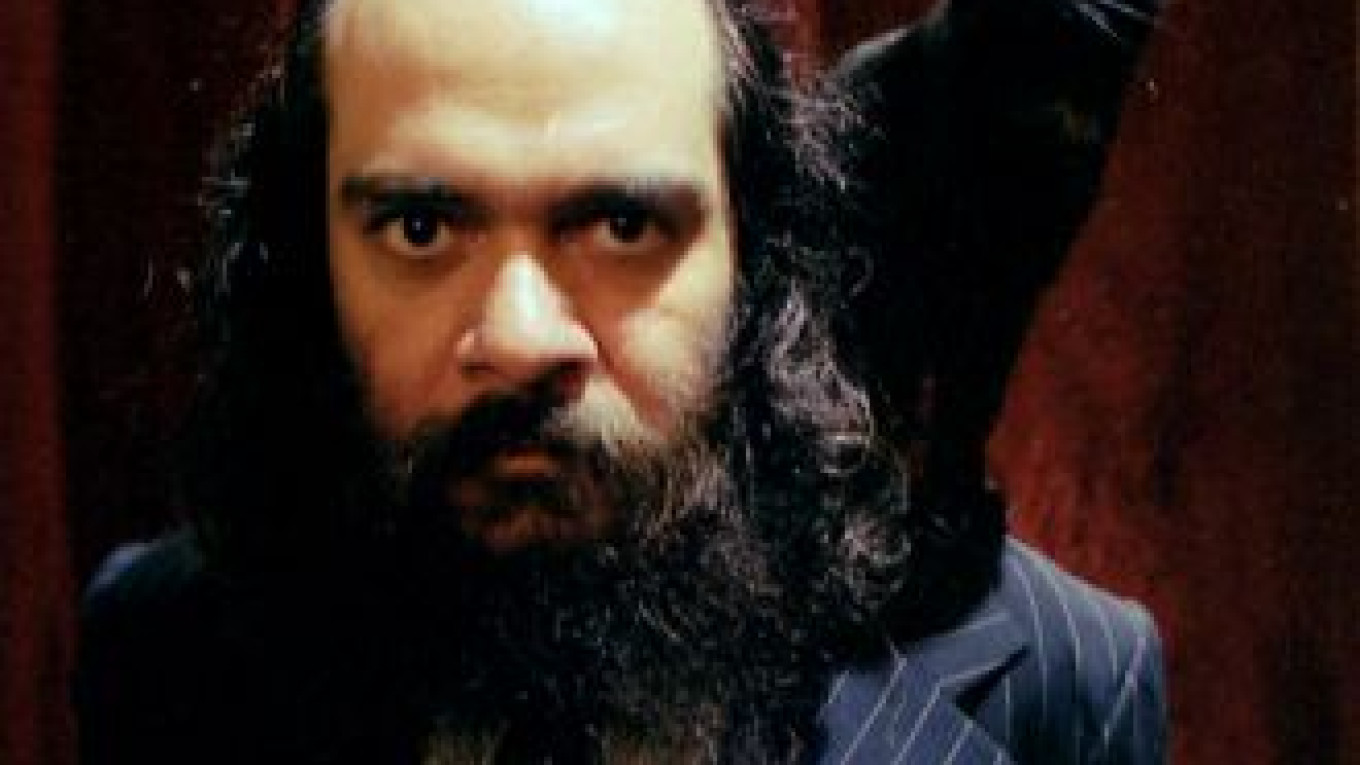Psoy Korolenko can be a hard man to pin down. As a musician, he combines styles and influences as varied as Jim Morrison, Leon Trotsky, klezmer music, Russian Silver Age poetry and Russian profanity.
A rare example of a musician widely known for his stage identity even though he is not a show-business celebrity, Psoy is recognized in Russia and abroad as a modern-day skomorokh, a class of medieval Russian troubadours known for the diversity of their one-man shows.
“There are other musicians in Russia who play Jewish music, and there are musicians who write songs with obscene words, but he is that and many other things,” said Alexander Gorbachev, deputy editor of Afisha magazine, who likes Psoy’s blend of intellectual and popular cultures. “I don’t know anyone to compare him to, here or abroad.”
A Moscow resident, Psoy travels the world working on multiple collaborative and solo projects at once. Occasionally, he even lectures on music, appears in films and publishes articles and critical essays.
In Moscow, he often plays his low-key, but unmistakably theatrical, concerts at artsy cafes like Apshu, Masterskaya and Proyekt O.G.I. Internationally, he performs at klezmer festivals and even at universities in Israel, Europe, the United States and Canada. He released his first album in 2000 and has since come out with eight more.
The small venues where he performs are usually packed when he plays. A recent klezmer concert that Psoy had at cafe Apshu in Moscow was jammed with a young, energetic crowd of shiny hipsters and clean-cut intellectuals. The audience begged Psoy for his songs that toy brazenly with Russian profanity.
One of Psoy’s most popular YouTube videos, for example, features him singing his hilariously upbeat “Uyobishche,” or “F---er,” with Natalya Belenkaya. Psoy cheerfully sings to her the refrain, “A
f---er I am, a good woman you are.” And she replies equally joyously, “A good woman I am, a f---er you are.”
Psoy’s stage name is his project’s brand. Born as Pavel Lion, the musician borrowed “Psoy Korolenko” in part from the marginal Russian writer Vladimir Korolenko. The name is also a play on the word pyos, or male dog, and a foolish character in the classic plays of Alexander Ostrovsky.
For Psoy, who wrote his Russian literature doctoral dissertation on Korolenko, the name is a way to show that he, as Korolenko, explores subjects of marginality, diasporas, minorities, immigration and otherness. These topics are central to his use of folk songs, popular hits and poetry, among many other sources of his music. Psoy also sings in English, French and Yiddish, as well as Russian.
His background as a scholar at Moscow State University shows when he speaks. He talks articulately about his work and is eager to explain its serious, philosophical lining.
“I prefer to switch from one language to another, also sometimes from one style to another and from one register to another, thus opposing stereotypes and ready-made meanings of what is low and what is high, what is pop and what is classic,” Psoy said. “In my show I very strongly oppose constructed tastes, which to me are to a large extent stereotypes and prejudices.”
In one effort to undermine constructed tastes, Psoy punningly and illogically references the overly popularized figures of contemporary intellectual discourse, like psychoanalyst Jacques Lacan and philosopher Martin Heidegger. His song “Pripev Dva Raza,” or “Refrain Two Times,” is a good example. The less profane of its lines includes, in Russian, the downright silly, “I’m Bataille, you’re Lacan, let’s go quickly dance the cancan.”
Psoy deliberately refuses labels like “postmodernist” or “new age.”
“Good art must both consider existing frameworks and trends and at the same time be irreducible to them,” he said.
Politically, too, Psoy tries to remain irreducible, with lyrics that, when taken literally, offer mixed and confounding political messages. Psoy’s 2008 project with American musician and author Daniel Kahn, called “The Unternationale,” has received criticism for its bewildering presentation of Zionist and anti-Zionist ideologies.
In the song “Tsionistn,” the pair sings to upbeat, folk-tune lines like, “All you foolish little Zionists / with your Utopian mentality / you’d better go down to the factory / and learn the workers’ reality.”
Kahn said the album’s aim is merely to pose questions, not answer them.
“It’s about raising questions playfully, that would subvert the way that we think about these big issues,” he said.
Psoy Korolenko will play Proyekt O.G.I. on Wednesday, April 7, at 10 p.m., 8/12 Potapovsky Pereulok, Bldg. 2. Metro Chistiye Prudy. (495) 627-5366. More information is at http://psoy.badtaste.ru and www.myspace.com/psoy.
A Message from The Moscow Times:
Dear readers,
We are facing unprecedented challenges. Russia's Prosecutor General's Office has designated The Moscow Times as an "undesirable" organization, criminalizing our work and putting our staff at risk of prosecution. This follows our earlier unjust labeling as a "foreign agent."
These actions are direct attempts to silence independent journalism in Russia. The authorities claim our work "discredits the decisions of the Russian leadership." We see things differently: we strive to provide accurate, unbiased reporting on Russia.
We, the journalists of The Moscow Times, refuse to be silenced. But to continue our work, we need your help.
Your support, no matter how small, makes a world of difference. If you can, please support us monthly starting from just $2. It's quick to set up, and every contribution makes a significant impact.
By supporting The Moscow Times, you're defending open, independent journalism in the face of repression. Thank you for standing with us.
Remind me later.


